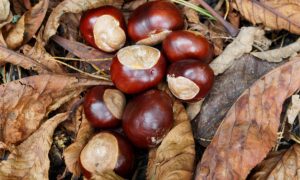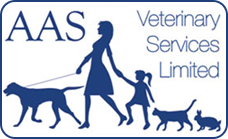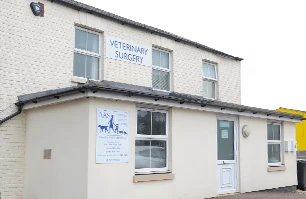Navigating autumn’s hidden hazards: Can dogs eat conkers?
As the vibrant autumn leaves begin to fall, our canine companions eagerly join us in exploring the wonders of autumn. Amidst this picturesque backdrop, one common autumn sight is the iconic conker – the intriguing, shiny chestnut-like seed from horse chestnut trees.
Conkers possess a charming allure for children, adults, and animals alike. However, as dog lovers, it’s crucial to be informed about the potential risks that these seemingly innocent seeds pose to our furry friends. In this article, we explore the question, “Are conkers harmful to dogs?”
What makes conkers poisonous to dogs?
Conkers can be poisonous to dogs, although fatalities are rare They contain a toxic compound known as aesculin. When ingested, this compound can cause a range of health issues for dogs, varying in severity depending on the quantity consumed and the size of the dog. If conkers are swallowed whole, this can cause a blockage in the gut, especially in small dogs.
If you have any immediate concerns, get in touch with AAS Veterinary Services in Gloucester today.
Symptoms of conker poisoning in dogs
Should your canine companion decide to have a conker feast, it’s important to be on the lookout for any tell-tale signs of distress. Your dog may show signs of conker ingestion within a matter of hours, and these can include:
- Vomiting and diarrhoea: Gastrointestinal distress is often one of the first signs of conker poisoning. If you notice your dog vomiting or experiencing diarrhoea, contact your vet immediately. Especially if you notice any blood coming out along with it.
- Excessive dribbling: Excessive salivation can indicate that your dog has ingested something harmful. Keep an eye out for unusually wet patches around your pet’s mouth.
- Excessive drinking: Your dog may have lost a lot of liquid from dribbling or vomiting, leading them to want to drink a lot more than usual.
- Abdominal pain: Dogs experiencing abdominal discomfort might become restless or show signs of discomfort when touched.
- Lack of appetite: When they are vomiting, experiencing pain, or excessively drooling, you may also notice that your dog has stopped eating.
- Lethargy: If your dog seems unusually tired or lethargic after a conker encounter, this could be a red flag.
- Tremors or seizures: In severe cases, conker poisoning can lead to tremors, seizures, and even paralysis. You may also notice that your dog is unable to walk in a straight line.
It is important to note that your dog may become ill between 1 and 6 hours after it has eaten a conker. However, there have been rare circumstances where symptoms of conker poisoning have presented after a few days of it being eaten. So, it is crucial to keep a watchful eye over your dog for a few days if you believe it has been eating conkers.
If you have any immediate concerns, get in touch with AAS Veterinary Services in Gloucester today.
How poisonous are conkers to dogs?
While nibbling on small portions might just lead to a mildly upset stomach in your furry companion, indulging in larger quantities could potentially trigger more serious health issues. Conkers have a very distinct bitterness that acts as a natural deterrent for the average dog. This makes it unlikely for them to ingest the large amounts that would result in serious illness. However, every dog can react differently to toxins and so it’s important to keep a close eye on your four-legged friend.
Are just the fallen conkers poisonous?
In fact, the entire horse chestnut tree is poisonous and can make your dog unwell. The aesculin toxin can be found in the seeds (the conkers), the tree’s leaves, bark, and flowers. So wherever possible, we recommend that you prevent your dog from interacting with any part of the tree.
How to identify a conker:

Begin by looking for their distinctive appearance – a glossy, rich red/brown colour that’s smooth to the touch. Conkers are usually enclosed in a spiky, green outer casing, which eventually dries and splits to reveal the polished seed within.
If you hold a conker and it feels heavy, this is a sign that it is in its mature state. Additionally, the subtle swirls and patterns on the surface add to its unique appearance. Learning to identify these seeds can make life a lot easier if you find your dog eating something strange on your walk.
Preventative measures: How to stop dogs from eating conkers
Prevention is, without a doubt, the cornerstone of responsible pet care. During your autumn strolls, remain watchful of your dog’s explorations around conkers and discourage them from playing with or ingesting these seeds.
There are a few precautions which can make autumn walks a safer and more enjoyable experience:
- Keep your furry companion on a leash, particularly in places that are abundant with conker trees
- Use a ball or a chew toy as you approach conker trees as a diversion – this simple measure keeps their mouths busy and reduces the likelihood of them munching on these tempting seeds.
How we can help with a suspected conker poisoning
Guarding your dog’s health requires a holistic approach that extends beyond hazard awareness. Following an assessment with the vet, your dog may need treatment to help with dehydration, nausea, or discomfort. In some cases, your dog may even need medication to make them vomit the conkers back up.
Contact AAS Veterinary Services today!
Autumn walks with your furry friend can be a joyous experience, but it’s essential to be aware of the potential dangers that lurk amidst the beauty of the season. Your pet may be interested in any conkers they come across, but a vigilant eye and informed approach will guide us in safeguarding our pets from hidden hazards.
Amidst the rustling leaves and the scent of adventure, let’s remember to prioritise our dogs’ safety. Occasional visits with your local AAS Veterinary Services in Gloucester, will help with their preventative care.
Together, let’s ensure that our canine companions can safely enjoy the autumn season.
If you have any concerns about your dog’s health or changes in their behaviour, contact AAS Veterinary Services in Gloucester today.






